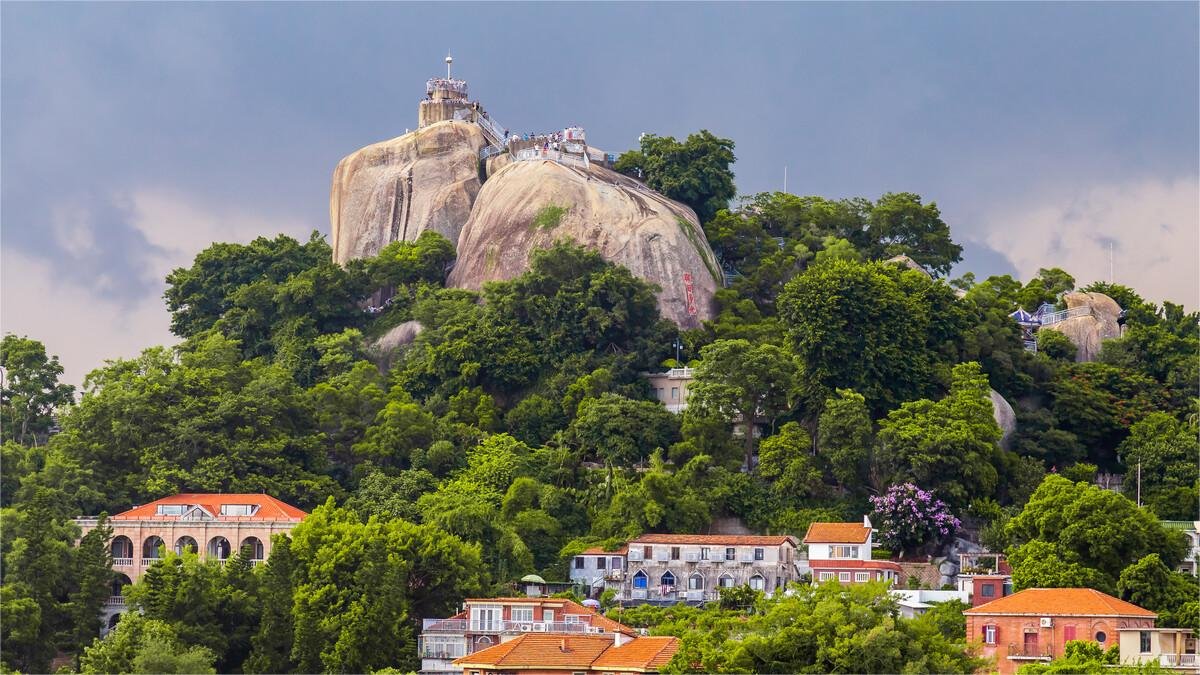Sunlight Rock (日光岩, Riguang Rock), also known as “Rocky Mountain (岩仔山)” or “Huang Rock (晃岩),” is highest point on Gulangyu Island, Xiamen, raising to a height of 92.7 meters. According to legend, in 1641, Zheng Chenggong visited Huang Rock and was so impressed by its beauty that he believed it surpassed that of Mount Nikkō in Japan. He then renamed it “Sunlight Rock” by splitting the character “晃” into “日光.”
Geographically, Sunlight Rock is the first place on Gulangyu Island to be bathed in the morning sunlight, making it an ideal spot for watching both sunrise and sunset. From its summit, visitors can enjoy a 360-degree panoramic view of the entire island and parts of Xiamen City.
The top of Sunlight Rock features a small viewing platform surrounded by railings. However, it tends to get very crowded during peak tourist seasons, especially during the day. To avoid the crowds and enjoy a more serene experience, it is recommended to visit either before 9 AM or after 5 PM when fewer visitors are present, offering a unique and tranquil perspective of the landscape.
Table of Contents
- Basic Information
- Location and Transportation
- Highlights of Sunlight Rock
- Vlog about Sunlight Rock
- Other Attractions on Gulangyu
Basic Information
| Estimated Length of Tour | 1 hour |
| Ticket Price | 50 RMB |
| Opening Hours | 8.00 – 18.00 (1st June – 30th September) 8.00 – 17.30 (1st October – 31st May) |
| Telephone Number | 0086-0592-2062868 |
Location and Transportation
Sunlight Rock is located in the southern central part of Gulangyu Island, Xiamen, Fujian Province. Visitors can reach Sunlight Rock by walking approximately 1.7 kilometers after arriving on the island.
Highlights of Sunlight Rock
Inscribed Calligraphy

Standing at the entrance of Sunlight Rock, visitors are greeted by a massive rock towering over 40 meters high. On this cliff face, the prominent horizontal inscription “天风海涛 (Heavenly Wind and Sea Waves)” by Xu Shiying from 1915 catches the eye. Below it, two significant inscriptions add to the historic ambiance. On the right, “鼓浪洞天 (Gulang Wonderland),” penned by Ding Yizhong from Jiangsu in 1573 during the Ming Dynasty, represents the earliest inscription on Sunlight Rock. To the left, “鹭江第一 (The First of Lujiang),” written by Lin Cheng from Fujian during the Daoguang period of the Qing Dynasty, sits nearby. Although both inscriptions seem similar and close in appearance, they were carved over two hundred years apart. These three major cliff inscriptions provide a vivid summary of Sunlight Rock’s scenic beauty and leave a lasting impression on visitors.
Longtou Mountain Fort

Longtou Mountain Fort is a historic remnant from when Zheng Chenggong stationed his troops on this mountain. To the right of the fort’s gate stands the “Wanzai Pavilion.” Below the pavilion is a large, flat-topped rock that is 15 meters high and 6 meters wide, facing south and looking north across the river towards Xiamen. The rock features the vigorous inscription “闽海雄风 (Majestic Scenery of Min Sea),” with the words “Former Site of Zheng Chenggong’s Naval Drill Platform” inscribed on the upper right. Another notable inscription on a nearby rock is a five-character quatrain by Zheng Chenggong: “礼乐依冠第,文章孔孟家。南山开寿域,东海酿流霞 (Rituals and music in grand houses, literature from the family of Confucius and Mencius. Southern mountains open longevity realms, Eastern sea brews heavenly nectar).” This poem, written in Zheng Chenggong’s own cursive script, was later imprinted and inscribed by admirers in 1918.
Ancient Summer Retreat Cave

The Ancient Summer Retreat Cave is located halfway up Sunlight Rock. This natural stone cave is formed by several large rocks stacked together. Above the entrance, the four large characters “古避暑洞 (Ancient Summer Retreat Cave)” are inscribed in clerical script by Shi Shijie. Each character is about 0.60 meters high and 0.90 meters wide, with Shi Shijie’s name signed on the left in regular script. The cave is known for its cool, refreshing breeze, making it a popular spot for escaping the summer heat. After Japan’s imperialist invasion of Taiwan in 1895, Shi Shijie moved his family inland, staying in Quanzhou and Xiamen. It was likely during this period that he inscribed the cave’s name.
Sunlight Rock Temple

Sunlight Rock Temple, one of the four major temples in Xiamen, was established in the 14th year of the Wanli reign during the Ming Dynasty, giving it a history of over 400 years. The temple’s name comes from its location at the foot of Sunlight Rock, where the rising sun illuminates both the rock and the temple. The temple serves as the gateway to Sunlight Rock. Built along the mountainside, the temple blends seamlessly with the scenic area, with no separating walls on the side connected to the rock. On the other side, the steps leading to the main gate feature calligraphy by Master Hong Yi. Within the temple courtyard, several buildings are distinctly arranged, showcasing the elaborate and intricate architecture typical of southern Fujian. From the courtyard, one can see the drum tower and bell tower, and looking further up, there are stone carvings leading to the blue sky, creating a sense of peace and serenity.








